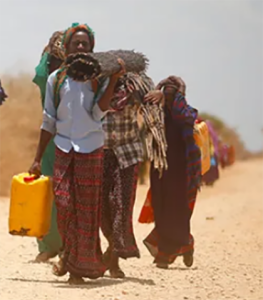IMRF conference a chance to address climate migration
The global climate crisis and migration are becoming more and more entwined as the negative impacts of climate change displace growing numbers of people, a major global conference has heard.
The International Migration Review Forum (IMRF), which was held in New York this month, was hailed as an important opportunity to highlight the issue of climate-driven migration.
 Advocates told the conference that climate change is a threat multiplier.
Advocates told the conference that climate change is a threat multiplier.
Executive Director of the US’ National Network for Immigrant and Refugee Rights Catherine Tactaquin said that climate changes was exacerbating existing inequalities, such as economic disparity between countries and inequities among populations due to race, gender, class.
“It also reaches into every corner of modern life, making it futile to approach it through the usual issue silos. We need a comprehensive approach that builds on points of intersection to create sustainable economies and ensure that rights and justice are secured,” Ms Tactaquin said.
“Workers, women, and those populations most affected by the global pandemic and structural inequities need to be central to deliberations in both climate and migration arenas. Policy desperately needs to catch up with this reality. It needs to recognise the rights of those displaced due to climate and the need for avenues for safe migration that offer long-term solutions,” she said.
The IMRF was convened to discuss the Global Compact on Migration, signed four years ago.
Since them climate experts have announced the acceleration of global heating beyond previous predictions.
“There is a growing concern GCM’s laudable commitments to addressing the adverse drivers of migration and to ensuring “safe”, regular and orderly migration are being watered down and even contested,’ Ms Tactaquin said.
“Hedging on commitments and progress is especially concerning given the consequences that we are already seeing on a daily basis worldwide,” Ms Tactaquin said.
“Most climate-related displacement will remain internal to countries; however, pressure to move across borders is always present, especially when countries fail to provide support for displaced populations.
“In some cases, such as in the Pacific region, relocation is becoming inevitable. Although the region contributes only 0.03 per cent of global greenhouse emissions, it is experiencing more extreme weather, rising seas, increased sea and land salinization and loss of land and fishing.
“Increasingly, climate displaced persons are becoming part of what are known as ‘mixed migration flows’: people moving across international borders, with or without migration documents, as asylum seekers, migrant workers, and refugees.
“Categories of persons on the move are becoming ever more blurred, and as a result nearly all migrants are facing additional challenges at borders and in their new countries.
“Negative, racist, and violent hostilities persist against so-called ‘climate migrants’, and some governments have deemed them ‘security risks’.
“This is especially concerning within the context of the global health pandemic, where migrants have been scapegoated for the spread of the virus. In some countries, this tendency has led to more restrictive immigration policies and militarised border controls,” Ms Tactaquin said.












